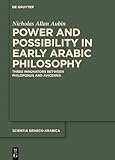Power and Possibility in Early Arabic Philosophy : Three Innovators Between Philoponus and Avicenna / Nicholas Allan Aubin.
Material type: TextSeries: Scientia Graeco-Arabica ; 37Publisher: Berlin ; Boston : De Gruyter, [2023]Copyright date: ©2024Description: 1 online resource (IX, 286 p.)Content type:
TextSeries: Scientia Graeco-Arabica ; 37Publisher: Berlin ; Boston : De Gruyter, [2023]Copyright date: ©2024Description: 1 online resource (IX, 286 p.)Content type: - 9783111324920
- 9783111325132
- 9783111325088
- 185 23/eng/20240213
- B744.3 .A93 2024
- online - DeGruyter
- Issued also in print.
| Item type | Current library | Call number | URL | Status | Notes | Barcode | |
|---|---|---|---|---|---|---|---|
 eBook
eBook
|
Biblioteca "Angelicum" Pont. Univ. S.Tommaso d'Aquino Nuvola online | online - DeGruyter (Browse shelf(Opens below)) | Online access | Not for loan (Accesso limitato) | Accesso per gli utenti autorizzati / Access for authorized users | (dgr)9783111325088 |
Diss. HU Berlin 2019.
Frontmatter -- Acknowledgements -- Contents -- Introduction -- Chapter 1 Philoponus and the Finite-Power Argument -- Chapter 2 Ibn Suwār on the Coming-To-Be of the World -- Chapter 3 Abū l-Ḥasan al-ʿĀmirī and Philoponus on Nature -- Chapter 4 Abū Sahl al-Masīḥī: The Science of Nature and the Nature of Science -- Chapter 5 Avicenna and his Influences -- Chapter 6 Conclusions -- Appendix. Abu Sahl al-Masīḥī’s Principles of the Science of the Pulse -- Bibliography -- Index
restricted access online access with authorization star
http://purl.org/coar/access_right/c_16ec
"The world is a finite body, and therefore has finite power." John Philoponus is remembered for using this Aristotelian premise to break ranks with Aristotle and argue that the world is not everlasting. This investigation reconsiders Philoponus’s arguments from finite power, and then explores the aftermath of this line of thinking in the works of three lesser-known Arabic intellectuals active in the generation before Avicenna (d. 1037): Abū l-Ḫayr Ibn Suwār (d. after 1017), Abū al-Ḥasan al-ʿĀmirī (d. 992), and Abū Sahl al-Masīḥī (d. after 1025). Each engaged with this dictum in unique and novel ways, and in so doing anticipated a number of central features of Avicenna’s writings. The history of this argument is of crucial importance for understanding the evolution of natural philosophy and metaphysics in this formative period, away from tedious and simplistic arguments about creation and towards a more robust modal ontology based on intrinsic and extrinsic necessity.
Issued also in print.
Mode of access: Internet via World Wide Web.
In English.
Description based on online resource; title from PDF title page (publisher's Web site, viewed 02. Jun 2024)


